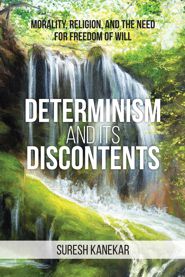
Determinism and Its Discontents
Morality, Religion, and the Need for Freedom of Will
by Suresh Kanekar
- Number of Pages: 160
- ISBN-10: 1627343628
- ISBN-13: 9781627343626
- Publisher: Universal-Publishers
- Year: 2021
- Category: Psychology, Social Science
Synopsis
The deterministic position is that all events are effects of previous events and causes of future events, in inexorable cause-effect sequences, which leave no room for intervention of anything outside of the stream of causal relationships, such as free will, thus rendering moral responsibility meaningless. Libertarians believe in freedom of will which is, for them, indispensable for moral responsibility. This controversy can be resolved only by making a clear distinction between two kinds of freedom.In common parlance, freedom means freedom from constraint or compulsion, which can be designated as contra-constraintual freedom. The second meaning of freedom is freedom from causation, which has been referred to as contra-causal freedom, and this is the meaning that is inherent in the concept of freedom of will. If we have contra-causal freedom, we can choose or decide to act irrespective of antecedent conditions including our own past.
The distinction between contra-causal freedom and contra-constraintual freedom is the key to the resolution of the controversy between determinism and libertarianism. The absence of contra-causal freedom prevails at the theoretical, conceptual, objective, abstract, or as-is level, whereas contra-constraintual freedom functions at the practical, behavioral, subjective, concrete, or as-if level. All we need for moral responsibility is contra-constraintual freedom, and not contra-causal freedom. At the as-is level, there is neither freedom nor dignity, neither morality nor accountability, and neither purpose nor meaning for human existence. It is only at the as-if level that these terms make any sense at all. In theory there is no choice from alternative courses of action in light of the absence of contra-causal freedom; in practice there is, in direct proportion to contra-constraintual freedom. And that practice forms the foundation of criminal jurisprudence and moral behavior in general, without which human civilization would not survive.






 View or Post a Review at Amazon.com
View or Post a Review at Amazon.com